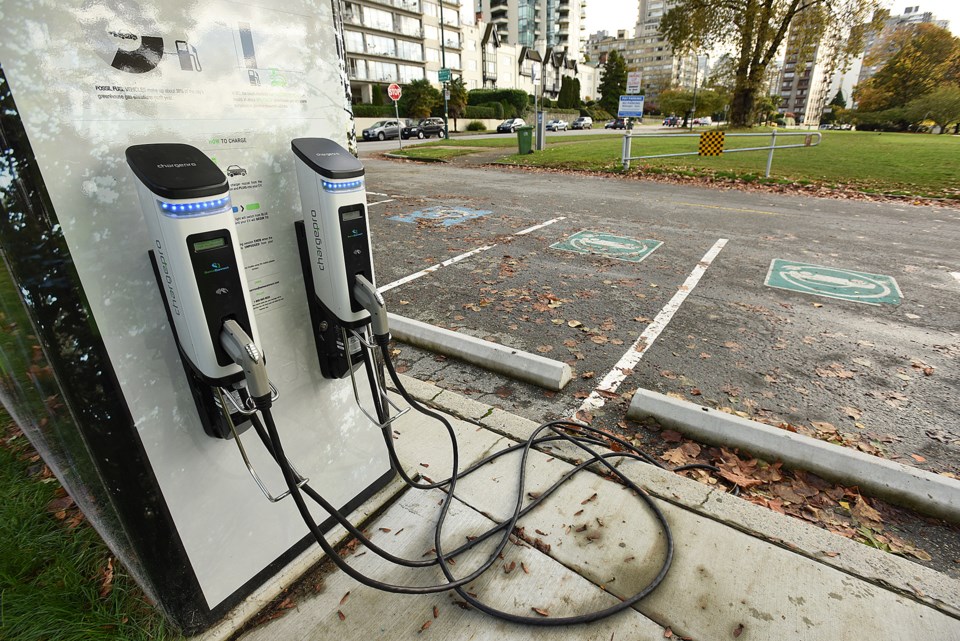The Vancouver Park Board’s three most prominent electric vehicle charging stations, a showcase of Vision Vancouver’s Greenest City 2020 Action Plan, were rarely used during the first seven and a half months of 2014.
Data released to the Courier via Freedom of Information shows the three locations in civic parking lots at Sunset Beach, near the foot of Cardero Street and near the foot of Broughton Street were used for 760 hours — the equivalent of 31 days — during the 226-day period between Jan. 1 and Aug. 15. A spreadsheet claims there were an average 1.4 charging sessions a day, for daily averages of 12.24 kWh and 145.34 minutes.
The pilot project involves Telus, which installed nine-metre tall cellular poles at each station to expand its voice and data network capacity. A May 30, 2012 report to the park board said there was no cost to the city, only a benefit for 20 years. The sites were to bring in $11,500 each on annual license payments, but the contract includes a $2,000 discount per site for a total $28,500 a year under the five-year, March 26, 2013 contract with a Calgary-based Telus subsidiary. Telus was responsible for the capital costs up to a maximum $10,000 per site and licence fees are supposed to climb 10 per cent after each five-year term.
The total energy used at the three stations during the period was 2,761.19 kilowatt hours, enough to displace 1,104.48 litres of gasoline. The most power used in a single charging session was 69.419 kWh during an 11 1/4-hour period at the Cardero lot from 1:48 p.m. Feb. 18 to 1:03 a.m. Feb. 19.
By comparison, the charging station at Edible Canada on Granville Island recorded 996 charging sessions during the same period, delivering 5,529 kWh and displacing 2,212 litres of gas.
The city issued a Jan. 18, 2013 purchase order to Ecospark Technologies Inc. of Toronto for a total $25,739.43 for the equipment.
It sent an Aug. 31, 2013 overdue invoice reminder to Telus for $29,935.40 owing from a July 31, 2013 invoice for the annual licence fee.
Vision Vancouver’s plan promotes electric vehicles as a long-term replacement for gas and diesel-powered cars and trucks. City hall wants to meet or beat World Health Organization air quality guidelines by 2020, even though it is subject to air pollution from neighbouring municipalities and operations of Port Metro Vancouver, which is under federal jurisdiction.
The 2013-2014 Greenest City implementation update said 93 charging stations had been installed. The park board staff report estimated 4.9 per cent of new vehicle purchases would be electric by 2017.
Despite being in parking lots with postcard views beside the densely populated West End, the root problem for the trio may be the slow sales of electric vehicles in B.C. An Oct. 6 report by Fraser Basin Council and BC Hydro’s Powertech said there were only 1,300 electric vehicles in B.C. as of July, a sliver of total vehicles in the province. Statistics Canada reported 74,761 passenger cars were sold in 2013 in B.C.
Jordan Bateman, B.C. director of the Canadian Taxpayers’ Federation, said traditional fuel stations would be “falling over each other” to install electric charging stations if there was consumer demand for electric vehicles, which cater to an upscale clientele.
“They just aren’t being used that much because there aren’t that many electric vehicles out there,” Bateman said. “It’s a classic case of government trying to make a market work that economics won’t.”
A provincial Clean Energy Vehicle program offered subsidies up to $5,000 until March 31. Sales through July of 374 electric vehicles were trending to beat the 505 sold province-wide in all of 2013.
Trevor Loke, park board chair and Vision Vancouver candidate in the Nov. 15 election, did not respond to an interview request by Courier deadline.
[email protected]
twitter.com/bobmackin



